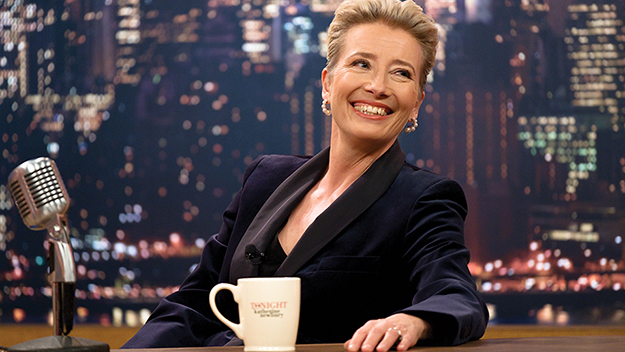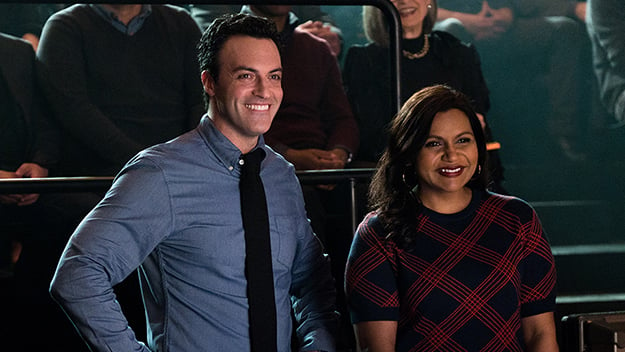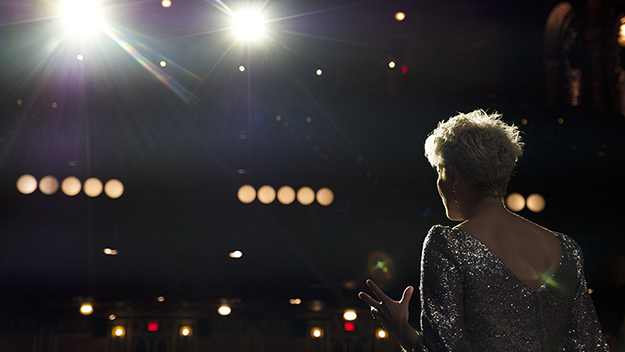Film of the Week: Late Night

Images from Late Night (Nisha Ganatra, 2019)
Late Night is a comedy about how things could and should be different, but it sometimes comes across more like a dramatized set of consultation proposals for implementing measures for difference. As a film about the business of comedy, it’s not that funny—which is a problem in a story about the challenge of being funny and staying funny in a changing world where humor, its targets, and its methods constantly have to change too.
Directed by established TV director Nisha Ganatra (her CV includes Brooklyn Nine-Nine and Dear White People as well as the 1999 feature Chutney Popcorn), Late Night stars and is written by Mindy Kaling, whose showcase series The Mindy Project Ganatra has also worked on. The theme is American TV comedy and its perennial domination by white males—even when shows are fronted by white women. Kaling’s character Molly Patel may be the protagonist in Late Night—just as Anne Hathaway’s gauche novice was in The Devil Wears Prada—but the magnetic center of the story, this movie’s answer to Meryl Streep’s compellingly rebarbative Miranda Priestly, is played by Emma Thompson. She is Katherine Newbury, a TV comic and talk host whose long-running late-night show has failed to keep up with the times, its ratings flagging even while Newbury’s coolly ironic humor and crisp, no-nonsense dignity (her nightly sign-off: “I hope I’ve earned the privilege of your time”) still afford her respect and prestige.
The crunch comes when her network boss (Amy Ryan, less acidic than she can be, but still excellent) announces she’s not axing the show, just Katherine. Her humor is dated, audiences find her aloof, and her choice of guests (Dianne Feinstein, author Doris Kearns Goodwin) is too virtuously high-minded (indeed, you can’t help thinking of The Simpsons’ Sideshow Bob espousing the virtues of The Springfield Review of Books—“Just look at these amusing caricatures of Gore Vidal and Susan Sontag!”).
Faced with replacement by an obnoxious, brashly reactionary young male stand-up (Kaling’s TV compadre Ike Barinholtz, here resembling a weasel’s impersonation of Mark Wahlberg), Newbury has only one hope of survival. She needs to do what hipper, more approachable hosts are doing: be more like Jimmy Fallon, she’s told, who washed a sheepdog live with Robert Downey Jr. She swallows her pride and books a YouTube sensation who made her name celebrating her dog’s smelly butt—but this backfires when the online ingénue proves smart enough to protest against Newbury’s supercilious irony. Newbury seems doomed: after all, she doesn’t know the difference between downloading and uploading; proudly admits, “I’m not a people person”; and is icily English in a way that still stands as shorthand for emotional disability in American comedy.

Enter, however, her lifelong fan Molly Patel (Kaling), an aspiring stand-up and employee at a chemical plant who manages to get a meeting with Newbury’s producer Brad (a good-naturedly harassed Denis O’Hare). It so happens that Newbury is irked at being reminded that she’s a faux-feminist who really hates other women, so she insists that Brad hire a woman instantly—and Molly gets the gig. The guys in the writers’ room don’t like this, of course: a somewhat predictable collection of cynical, time-serving bros, they number a couple of macho meatheads, a buttoned-up dweeb, a slobbish dork or two, and a camp, catty misogynist (John Early, who gets some of the pithier lines). But Molly gradually breaks down their prejudice, and with her can-do spirit, quick-wittedness, and willingness to speak truth to power (“Fuck how things work”), she proves the one to get Newbury back on track.
Part of the joke is that Molly saves the show (literally) not just because she’s smart and funny but also because she has a structured managerial approach; in one scene she reads out a list of proposed improvements based on her skill set as a quality control manager, diagnosing complacency and identifying three associated problem areas. Kaling makes the most of Molly’s application and seriousness, pitching her somewhat along the lines of Amy Poehler’s facilities administrator Leslie Knope in Parks and Recreation—but where Knope’s uptight but ebullient idealism is funny in the context of a small-town government office, Molly’s Eagle Scout approach to Optimization of Comedic Outcomes comes across as a little joyless.
As a former writer and performer on The Office, Kaling clearly knows what she’s talking about, which gives Late Night a considerable directness and candor. The film makes a lot of the points that you expect it to make—in terms of its argument, quite rightly so. But it feels somewhat like the product of a story development spreadsheet, bullet points highlighting Contemporary Themes and Memes. One such theme is the inability of showbiz veterans to keep abreast of social media: Newbury tries out a thread of new-to-Twitter jokes and fails miserably. There are riffs on the terms “slut-shaming” and “white savior,” but these feel like conscious plays on current cultural-debate keywords; future viewers may need footnotes once the vocabulary has changed (even if the issues don’t), Characters in Late Night often say exactly the things you expect them to, whether it’s meant straight or with a slight comic skew. If you went to a workplace like Molly’s, no doubt you would hear men saying, “I wish I were a woman of color, so I could get any job I wanted with zero qualifications…”—and because you would hear it, the line has little satiric bite.
The film’s flatness comes partly from the feeling that Molly is never fully a character, more a principle—of optimism, truth, the necessity of a more diverse, empathetic society. We never quite believe in her personally wanting anything, other than a shining notion of excellence and justice. Kaling hasn’t really provided her character with any kind of interiority or (pardon the term) personal arc; Molly simply gets more confident and helps others to realize the best in themselves. There’s a vague romantic glimmer with amorous colleague Charlie (Hugh Dancy), who’s too much of a cookie-cutter alpha snake to convince. But she doesn’t really have a private being, telling Newbury, “I don’t have any friends . . . This show is all I have”—which either makes her depressingly one-dimensional or just suggests that the script hasn’t got round to fleshing her out fully. She is equipped with a young Asian family member who briefly plays comic foil; but, other than in rhetorical declarations, we get little sense of it meaning anything that Molly is a woman of color, her ethnic identity wrapped in half-hearted jokes about her aunt’s house, where she lives. A visiting colleague jokes, “It’s like you’re in Witness Protection and your secret identity is an elderly Indian woman.”

Katherine Newbury is more interesting, partly because of the strange tension between the sourness of the character and the strange aura of moral seriousness that somehow always hangs around Emma Thompson (except, arguably, when she’s playing Nanny McPhee). One headline we see lampoons Newbury as “your least favorite aunt,” although on her show she’s more like a school principal cracking arch jokes for the parents at Open Day. With her crisp, formal couture and frosted blonde crop (giving her an oddly antiquated look of Let’s Dance–era David Bowie), Thompson’s Newbury comes into her own behind the scenes as a Grade-A Horrible Boss backstage. Thompson’s enjoyably snippy, sardonic turn doesn’t remotely convince us that Newbury could ever have won the love of a TV audience, but it humanizes her enough to make us care what’s going on in the character’s life. To wit: a solemn void (like Molly, no friends) brought on by career obsession, and a thorny relationship with her husband (a benignly wry John Lithgow), who’s more like a long-suffering mentor. The domestic strand is something of a downer, though: the scene where the couple address their problems in a deserted theater might as well come with a caption reminding us that it’s time to lay aside our popcorn for one scene and bring out the tissues.
There are sharply insightful lines here: Brad warns Newbury, “Be careful of showing how you are—once you turn that switch on, you can never turn it off.” And, in a comedy that makes a point of eschewing the broad farce that so often comes as default, the finer touches are the funniest: saving Newbury’s bacon by playing devoted buddies at a party designed to improve the host’s PR image, Kaling’s Molly delivers a gently killer touch, laying her head on her boss’s shoulder just so. Otherwise, it feels churlish to say that other comedies about comedy, its institutions, and its narcissism have had more bite (The Larry Sanders Show, 30 Rock) but Late Night does suffer somewhat from Molly’s own oft-mocked earnestness. It’s just that there’s little sense here that anyone might derive real pleasure from the comedy racket; comedy seems to be about improving the world rather than promoting joy, subversive or otherwise. Late Night is very aware of needing to earn the privilege of our time, but it doesn’t quite earn the privilege of our laughter.
Jonathan Romney is a contributing editor to Film Comment and writes its Film of the Week column. He is a member of the London Film Critics Circle.







